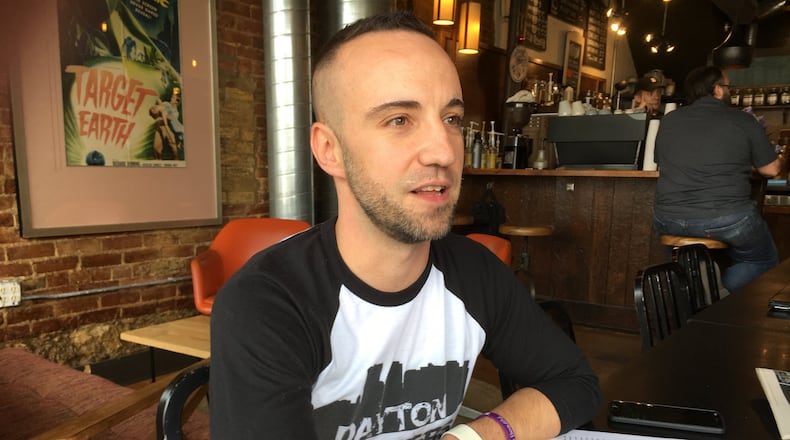“The public needs to know the reality, that there isn’t someone falling out on the corner right here, but there is somebody in recovery sitting right here,” he said on a recent morning at Ghostlight Coffee near downtown.
RELATED: Can Dayton go from ‘overdose’ capital to a model for recovery?
Part of changing the conversation involves the words those in recovery use to talk about themselves, he said.
"I'm a person in long-term recovery — which for me means that I haven't used drugs or alcohol for over 12 years," says Steckling, 35, using the template for speaking about recovery that is promoted through training by national recovery advocates Faces and Voices of Recovery.
The next piece is usually to talk about the “gifts of recovery” he’s experienced.
“Since that time I’ve become a husband, I went back to school twice, I’ve become a father, active member of my church community and then eventually a chemical dependency counselor and international missionary and a licensed social worker,” said Steckling, who now lives in Kettering with his wife and daughter.
THE PATH FORWARD: Dayton Daily News Investigates digs into the region's most pressing issues
Beyond being gifts to himself, those are all ways in which he’s become a valuable member of the Dayton community again, Steckling said. His group is working to spread that message of value to business leaders and community stakeholders who may otherwise view those with substance-abuse disorders as dispensable.
“I’ve had the opportunity to counsel and work with thousands of people in several countries because of the recovery support that I got,” Steckling said. “That’s what the value is that a recovering person can add to our city, and we want the city to see that.”
RELATED: How can Dayton recover from the opioid crisis? 10 change makers weigh in
Dayton Recovers sells clothing with its logo at events and online. Wearing a T-shirt identifying oneself as a person in recovery from drug addiction would not have been a popular choice even just a few years ago. But part of the movement the group is promoting is bringing the recovery community out of the shadows to be their own advocates.
“They provide so much value to the community that just isn’t really announced publicly,” Steckling said. “Because for decades people in recovery have kind of, in response to the stigma, been afraid to step out from the behind the curtain and say, ‘I’m a person in recovery.’ And that’s what this means to the community.”
The non-profit uses proceeds from clothing sales to fund a financial hardship grant — helping those in recovery with financial barriers like getting a driver’s license reinstated.
RELATED: Dayton mother of 7 working to repair relationships after addiction
Steckling has worked with recovery advocates in other states and said Ohio is ahead in terms of reducing stigma and breaking down barriers between treatment providers and other community resources.
“The untapped resource is the hiring,” he said. “(Employers) are the folks who hold a stake in whether the recovering person gets well. Because that job matters.”
A person in recovery has the potential to be the best employee on any staff, Steckling said, because of the things they’ve already overcome and their desire to not take their recovery gifts for granted.
RELATED: 'We're making a difference': A day with Dayton's overdose response team
“What we know from experience is that if we’re going to recover, it’s going to be as a community. It’s going to take the church groups, it’s going to take of course the legislators,” he said.
But Dayton Recovers’ target audience is the people who think they aren’t impacted by this crisis. Those who say, “I don’t know a person in addiction and what’s the difference?” Steckling said.
“Those are the people we need to make a decision to support recovery — because when that person gets on board, things can change overnight.”
RELATED: How can Dayton fix the opioid crisis? Tell us what you think
About the Author

